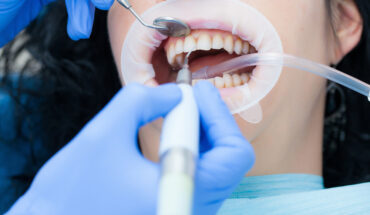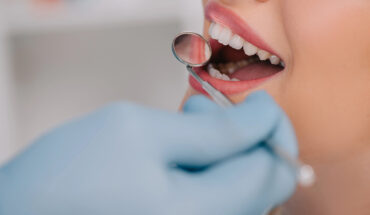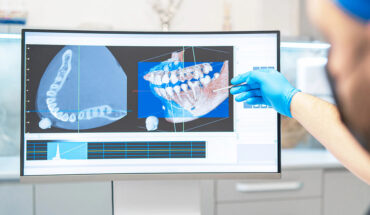
Sourced from the ADA News Bulletin
After an unprecedented lead-up that has included a global pandemic and the consequent change to an entirely virtual/digital format, the resulting World Dental Congress – Special Edition this year has become so much more than a sum of its parts. This month’s event has burst through boundaries to become an innovative and highly interactive experience that promises to deliver CPD and advance the industry in new and effective ways, and offer many combined ways in which members can enjoy everything it has to offer.
The ADA FDI 2021 World Dental Congress – Special Edition virtual event (Congress) is leaps and bounds beyond anything either organisation has produced ever before. This fully hosted event encompasses more than 200 Scientific Programme sessions and a highly interactive exhibition showcase.
This month’s Congress has been described as a “more highly produced television streaming service than Zoom”, considering its many possible streaming channels, interactive zones and chat functions combine to give it a real ‘choose your own adventure’ feeling. Some elements have been pre-recorded, while others are cutting-edge presentations using innovative technology such as video and other multimedia – and a huge swathe of the available content will be presented live and as it happens, hosted by world leaders in dental practice, academia and research, and industry.
Some of the biggest and best
“I can’t wait for everybody to log in!” says ADA President Dr Mark Hutton. “This is the best CPD opportunity that you could ask for, with the ability to have access to the presentations for a couple of months after the completion of the Congress. You really can ‘do it your way’ this year.”
Dr Hugo Sachs, Chair of the Scientific Division putting together the Scientific Programme, heartily agrees. “I would venture to say that this World Dental Congress, this virtual event and special edition, is probably the biggest one that’s ever been done. I say that because it’s got both a parliamentary and a scientific component to it.
“The World Dental Federation has its parliamentary programme, and that will be operating out of Switzerland on Central European Time.
But the Scientific Programme will be operating out of Australia, out of Sydney at the International Convention Centre on Australian time, so we are very excited.”
“It’s a bit like the United Nations of Dentistry, and there are about 140 National Dental Association members,” says Dr Shane Fryer, ADA National Organising Committee Chair. “They all form part of the General Assembly and operate like a World Dental Parliament out of Switzerland, out of Geneva, and they make policies that fit in across the world, taking in all of the different variations that occur within the different jurisdictions.
The Congress is open to all registered dental practitioners, from dentists to dental hygienists, to oral health therapists, to dental prosthetists. We’re expecting thousands of delegates from across the world, and Hugo, in his role as the chair of the Scientific Division, has structured a lot of the presentations to facilitate different time zones around the world, without compromising the Australian audience and the base here.”
The broadcast venue, the International Convention Centre in Sydney’s Darling Harbour, will have two professional hosts convening proceedings throughout the four days of the live event. Well-known and respected broadcast journalists Juanita Phillips and Sophie Scott have backgrounds in newsreading and reporting, and health reporting particularly in Scott’s case, adding another layer of professionalism to the event.
Exhibition highlights
“We are so excited with the calibre of the over 100+ speakers and contributors at this year’s Congress,” says Oscar van Elten, the ADA’s General Manager – Education, Events and Sales. Some of our highlighted speakers include Professor Paul Abbott (AU), Professor Mark Wolff (USA), Dr Finlay Sutton (UK), Dr Jan-Frederik Güth (Germany) and Dr Wendy Thompson (UK) – though there are so many more.
“Certainly, COVID may have forced our hand a little at making this year’s Congress entirely digital or ‘virtual’, but the unique opportunities this format has actually offered us really do add value to the experience – both for us as organisers and also for delegates attending.”
Making the most of the event
Do you have limited experience attending such a major event through a virtual, interactive platform like this? Here are some tips to maximise your enjoyment and enrichment stemming from this groundbreaking event, without getting overwhelmed by the sheer breadth of possibilities presented this year.
1 Don’t expect to take it all in at once
Breaks are built into the programme, so do take the time to explore beyond the main speakers. Discussion rooms and the exhibition showcase are all available to digitally ‘wander’ and engage more informally. An event of this magnitude can present a sense of overstimulation or ‘information overload’, which is exactly why there is a 60-day period where delegates can access all materials – play a presentation over again later, with the ability to pause and take notes, or check out exhibitors and products that may key into the subject matter of a presentation.
There are also several ways for you to interact with organisers, speakers and exhibitors, to ask all the questions you have in mind so that you can gain a full understanding of the many exciting and new concepts and ideas often introduced by an event such as this. On the other hand, preparing for Congress before the live event by reading blog posts, published articles or study abstracts by or about the main speakers will also give you additional depth of understanding and enjoyment.
2 Get comfortable, get prepared
When you attend a conference or event in a convention centre or hotel meeting area, there is always a breakout space furnished with comfortable seating, healthy snacks, drinking water and tea and coffee. Ensuring you have the same kind of comforts ready for yourself at home, means you can concentrate fully and easily on the event. Print out your agenda and any speaker materials, if that’s helpful for you, or have them open or readily available on your computer screen when you log in to the event. Choose a quiet location where you can attend uninterrupted (or quality headphones if you can’t), and take the time to dress for the occasion to help get your mindset ready for professional development. We won’t be able to see your ugg boots, of course, but you will!
3 Get social
As well as the chat and meeting functions of the Congress platform and the interactive zones (see Get interactive! on the next page), there are plenty of opportunities to engage with the ADA itself, and other ADA member delegates, on our social media pages. One of the real benefits of being a member of an organisation like this during these times of ‘stay at home’ and ‘social distancing’ is you still very much feel a part of a community of like-minded dental professionals. Visit the ADA on Facebook by searching ‘Australian Dental Association’ and ‘HealthyTeeth Australia’, follow on Twitter at @Aus_Dental, on LinkedIn by searching ‘Australian Dental Association’ and on Instagram (@AustralianDentalAssociation).
“In terms of accessibility, the virtual space is infinite,” says Oscar van Elten. “It can increase attendance globally by removing travel times, availability, and funding restrictions. We are opening opportunities for a wider audience to gather, giving you increased brand recognition on a global scale.
“When it comes to sustainability, this format allows us to reduce our event’s carbon footprint by eliminating air travel, ground transportation, hotel energy, venue energy, general waste and much more.
“Furthermore, the ‘on demand’ part of the digital platform really creates longer value and allows delegates, sponsors and exhibitors an ongoing opportunity to learn and interact before, during and after the event. Participants can connect virtually at more suitable times. Supporters can showcase and promote their products and services through virtual social communities and no longer worry about the lack of foot traffic and empty booths at a physical venue. Less travel, more value, effective interactions.”
Get interactive!
As befits such a prestigious international congress, the online platform on which Congress is being staged presents some cutting-edge opportunities for delegates to take in all the exhibitions that make Congress so comprehensive. Think 3D custom exhibitions, video features and the newest innovations on display from some of the industry’s leading organisations and brands – and well beyond the ability to ‘attend’ presentations during the live event, Congress also offers interactive zones where the virtual audience can engage with them.
To start with, you can navigate exhibitor’s interactive zones through the website’s exhibition showcase menu, then connect with exhibitors either through a form or live public or private chat. (Tip: be sure to check your computer or device’s security settings to enable notifications.) Public chat is akin to an informal conversation amongst the audience visiting an exhibition stall, while a private chat is just that.
Alternatively, delegates can click on specific exhibitor team members and chat with them one on one that way, and can also network with them face to face via the ‘book a meeting’ function on the event’s digital platform. A meeting request is set up via email, and it is important to note that meetings are not only available during the live event but in the 60-day period following the live dates as well.
Think of the live event period as simply beginning the conversation. The two months afterwards still offer the functionality and unmatched opportunity to connect formally or informally with some of the industry’s most forward-facing movers and shakers.
From challenge to triumph
“I think the challenges that last year and this year have presented for us all need no explaining,” says Oscar van Elten, “but it’s still been clear that the incredible research happening in scientific and in technical areas has continued apace.
“It was an honour to have been asked to undertake the role as the Scientific Programme Development Chair,” says Dr Hugo Sachs. “However, without the team that I have had the privilege to work with, this would have been impossible. The challenges have been many and from my viewpoint, when the decision to make the event virtual, this changed the dynamics.
“I am ever grateful, in particular for the mammoth assistance that Associate Professor Alan Broughton provided when things were tough. The challenges pale into insignificance when we have created such a Scientific Programme for the world to view. 200 hours-plus of CPD! I have met many wonderful people by electronic means, so many have been so helpful and obliging in their support for the WDC 2021. I would hope that the 2023 event provides us all with an opportunity to meet in person.
“If you haven’t registered it is not too late to participate in an FDI World Dental Congress without the burden and cost of travelling long distances,” adds Dr Mark Hutton. “I look forward to ‘seeing’ you there.”
A (not so) little history
Despite its 2021 iteration as such a modern and technologically advanced event, Congress possesses a fascinating history that goes back 120 years and beyond. In the late 1880s, there was a great need to share and improve general and professional knowledge of advances in dental and oral hygiene and healthcare. Dentists were, generally speaking, imperfectly trained and operating in a kind of knowledge vacuum.
Founder Dr Charles Godon addressed this concerning professional landscape (or lack of it) by organising international dental Congresses, the first of which took place in 1889 to, as the FDI states, “disseminate scientific and clinical advances [to] pave the way for excellence in the profession”. The early Congresses often addressed such essential topics as attaining uniformity in the teaching of dentistry, and increasing public information on dental care so as to stamp out charlatanism.
As early as 1893, there was a concerted effort to include women and female dentists in the Congress that year (a very uncommon move); the number of delegates that year exceeded 1,000 people, discussing such current developments as the injection of cocaine as local anaesthesia.
The Federation Dentaire Internationale (FDI) was officially founded in 1900, holding its first Annual International Dental Congress in 1901. It embraced publishing in 1903, setting up an International Press Commission, and in 1912 introduced ‘cinematographic lectures’ at its Stockholm event as a very early precursor to the video presentations of today.
Reconvening in 1922 in Madrid, after barely surviving WWI, a mere 20 delegates received an opening speech from King Alfonso XIII that said: “By your meeting here, you men of science give a lesson to the diplomats. Because, as soon as something can be done for the good of humanity, for you, nations do not exist anymore; nor do the hostilities which broke out in 1914. A much higher conception unites you all.”
It was a swift recovery from there, when only four years later at the 1926 Philadephia Congress, an incredible 15,000 delegates attended from 25 countries. Weathering WWII, FDI marked its 50th anniversary in Paris in 1950. Speakers at Congress have included popes, kings, and some of the industry’s brightest lights.




